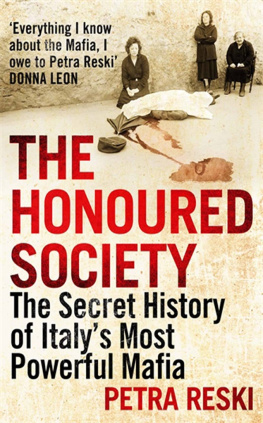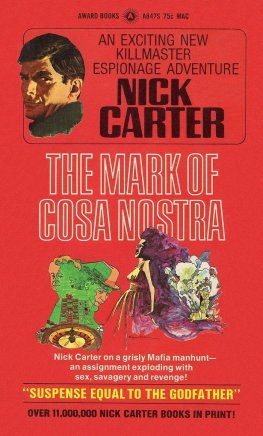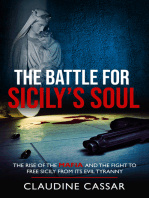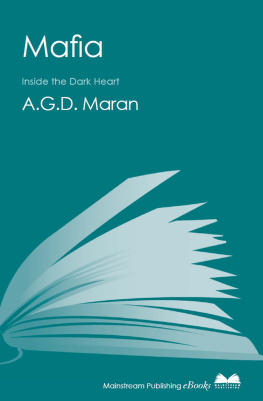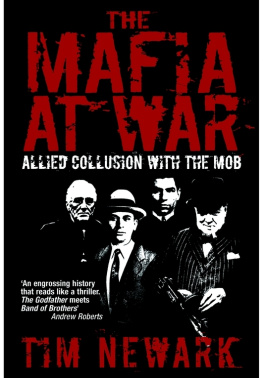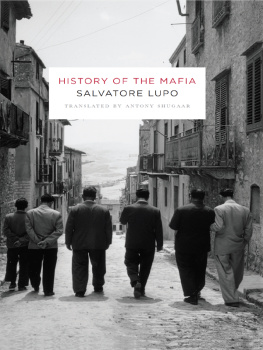Petra Reski was born in Unna, West Germany, in 1958. She has lived in Italy since 1989. Reski is a widely respected journalist, known for her investigative pieces about the Mafia.
Its always horrible, being present at a murder. Particularly if its a person you know. And if you dont know why that person is dying or has died. You dont know, and youll never find out. Because if youre acting as an ordinary soldier, as we call it in Cosa Nostra, they wont give you any explanations.
T HE MAN WEARS HIS DARK BLOND HAIR WITH A PARTING. HE has sea-blue eyes. A little double chin and womanly lips. Hes wearing a midnight-blue, double-breasted suit and clumsily balancing a briefcase on his knees.
He looks at his watch and then at the departure board for our flight from Venice to Palermo. The twenty-minute delay thats been announced is nearly over. When the stewardess opens the gate, he stands up and smooths the material of his suit over his knees. He looks oddly old-fashioned, as Sicilians often look when life has washed them northwardas if they came from a time long forgotten. Of course, he wears a monogrammed shirt. Sicilians celebrate elegance as something sacredly serious, like the businessman in the pinstripe suit pacing up and down by the gate, holding a little cigarillo that went out ages ago. Just like in Prizzis Honor. Or the woman with the big earrings and stockings, the tops of which stand out against her tight skirt when she crosses her legs. Just like Sophia Loren in Yesterday, Today and Tomorrow. Or the old couple who look like extras in a Dolce & Gabbana advertisement: the wife in a black suit and with her hair in a bun, the husband in a rough checked jacket. A couple who only communicate with each other in whispers and who, you can see, only leave their village once a year, to visit their son, whos found himself a job in the Veneto. Which the parents consider a terrible blow. Apart from these visible Sicilians, there are the invisible ones who dont look Sicilian in Venice at all, as if they had grown pale away from Sicily. Who are transformed during the flight. Who, with each minute in the air that brings them closer to Sicily, assume their original color.
The man in the midnight-blue, double-breasted suit is the first to board the airport bus; he doesnt set his little briefcase down on the floor but carries it under his arm, which makes him look oddly anxious, like a child going on its travels for the first time.
Generally the victim is brought to a house by a friend, his best friend if possible, so that he feels safe. Then they grab him, and if he still has something to say, he says it now. Id like to see the one who doesnt speak, with a noose around his neck. But regardless of whether he speaks or not, he gets killed anyway.
When we board the plane, I lose sight of him. The Sicilian woman with the garter belt sashays down the rows to her seat. The old Sicilian couple cart plastic bags and tied-up parcels down the aisle, as if they planned to stow all their household goods in the luggage rack. Apart from a few overweight American tourists struggling past the narrow rows of seats, the plane is full of Italians, most of them business travelers. I always take the evening plane from Venice to Palermo. I like to get there at night, just early enough to have dinner. When Im in my seat, I send another two texts: one to Salvo, my trusted taxi driver; one to Shobha, the photographer Ive been working with for so long that our relationships almost like a marriage. I tell them were twenty minutes late and ask Shobha to reserve a table in a restaurant for us.
As always, I plan to do a bit more work on the flight and start flicking through my archive material. Then I take from my pocket the book about the mystery of the lawyer Paolo Borsellinos red diary. When I open it, I immediately have the feeling that someones reading over my shoulder. Sicilian paranoia is starting even before Ive arrived in Sicily. Every time I fly to Palermo I wonder if its a good idea to read articles about Mafia bosses or investment strategies or flick through lectures about the Mafia and power. Or even read Antimafia Duemila, a newspaper that is always sent to subscribers in a strikingly neutral envelope, as if it were a porn mag. Sometimes I feel a bit rebellious and think: I dont care. Were living in Europe, after all, not in Transnistria! Italys one of the founding members of the EU! And sometimes I snap my book shut and put it away. As I do now.
When the man in the midnight-blue, double-breasted suit sits down in the same row as me, Im already flicking unexcitedly through the in-flight magazine, which says that an apartment in Venice will lay you golden eggs, because you can rent it out all year as a holiday apartment. He gives me a friendly but noncommittal nod, the way you greet a stranger with whom you have nothing in common but your flight route. The seat between us is empty, and the man sets his briefcase down on it.
Before I had to kill someone, I would cross myself. I would say: Dear God, stand by me! Make sure nothing happens! But I wasnt the only one who crossed himself beforehand and prayed to God. We all did.
I still remember every one of his sentences. To be able to speak to him, I had to apply to the Ministry of the Interior. I had to set out my motives and guarantee that I wouldnt ask him any questions about current trials. Our meeting had to have the agreement not only of the secretary of state at the Ministry of the Interior, but also of every individual public prosecutor in the Mafia trials in which Marcello Fava appeared, either as defendant or witness. Every week, at first, to check the state of things, I called the Servizio Centrale, the department of the Ministry of the Interior in Rome responsible for turncoat mafiosi, whose name sounds like some sort of secret-service operation. It was very quickly made clear to me, however, that my inquiries wouldnt speed up matters. Dont call us, well call you. For six months I heard nothing at all. And Id actually given up all hope when I got a call from Rome one afternoon. Servizio Centrale, said a voice. My application had been approved. I was to make my way to a bar in Rome, which, as fate would have it, bore the name Lo zio dAmerica, The American Uncle.
A few days later a taxi set me down a short distance from the bar. It looked like one of those labyrinthine Italian motorway service stations which you step into to get an espresso and leave with five CDs, some Sardinian donkey sausage, and a lump of parmesan. Behind an endless counter stood barmen with paper hats sitting on their gelled hair. When I was about to order an espresso, my phone rang. I felt in my pocket, from the depths of which it went on ringing, until a man standing next to me said: I called you. Please follow me.
I hadnt caught his name. I walked some distance behind him. For a split second I wondered what would happen if the man I was following wasnt the man I thought he was. I followed him along potholed pavements, past 1960s buildings and box hedges that smelled of cats. The periphery of Rome is so faceless that I had trouble remembering the way. At last he stopped outside the entrance to a building, where two men stood looking conspicuously inconspicuous, as only policemen can. The hallway smacked of a housing project, with greyish-yellow paint flaking off the walls.
Afterwards we would often go out to eat together. Maybe thats sadism. Could be, I dont know. And I dont know what else to call it, either. But thats what happened. We met up in the evening and went out to eat together. You just have to forget the whole business. Nothing happened, nothing at all.
The mafioso Marcello Fava was waiting for me on the third floor. In an apartment that had been rented by the Ministry of the Interior under a false namefor collaborators with the judiciary, as turncoat mafiosi are known in the politically correct and somewhat euphemistic language of the law. Since Marcello Fava was working with the public prosecutors office, he, his wife, and his two sons had to be protected from the revenge of Cosa Nostra. They had had to leave Sicily and live somewhere in Italy under police protection and false names.


